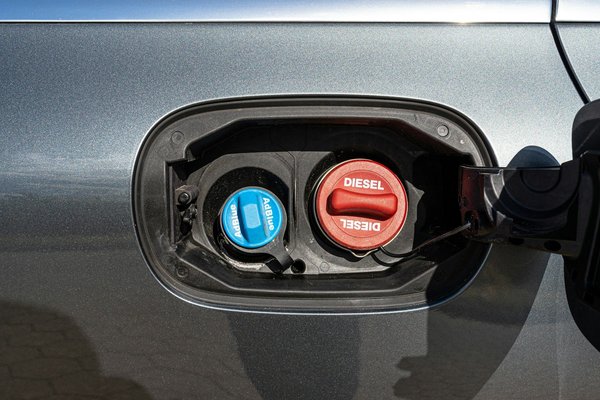Since the adoption of the Euro 6 standard in 2014, most diesel vehicles have been fitted with an exhaust gas treatment system called SCR (Selective Catalytic Reduction) to reduce pollutant emissions, particularly nitrogen oxides (NOx). This system uses an aqueous urea solution called AdBlue, which is injected into the exhaust gases to transform them into harmless water vapour and nitrogen. So what is the real use of AdBlue anti-crystallisers?
What are the problems generally associated with AdBlue?
AdBlue is sensitive to low temperatures and can crystallise, forming solid deposits in the tank, pipes and SCR catalyst. This crystallisation can lead to a number of problems, such as :
- SCR system malfunction: the crystals can clog the injectors and catalyst, reducing the efficiency of NOx reduction and causing error messages on the dashboard.
- Corrosion of components: AdBlue crystals can be corrosive and damage SCR system components, leading to costly repairs.
- Loss of power and increased fuel consumption: a faulty SCR system can lead to a loss of power and increased fuel consumption.
To avoid these problems, it is important to use an AdBlue anti-crystallising additive.This additive works by preventing the formation of urea crystals and keeping AdBlue in a liquid state, even at low temperatures. You can find out more by reading this article on AdBlue anti-crystallisers.
The benefits of using an AdBlue anti-crystalliser
There are several advantages to using an AdBlue anti-crystalliser.
Effective protection of the SCR system
The Selective Catalytic Reduction (SCR) system is an essential component of the anti-pollution system fitted to recent diesel engines. Its role is to convert harmful nitrogen oxides into harmless substances by injecting AdBlue. However, the urea contained in this liquid can form crystals at low temperatures and clog the fuel lines and injector. The addition of a suitable anti-crystalliser prevents this harmful phenomenon and preserves the integrity of the SCR system over the long term. Protected in this way against corrosion and damage, the system can continue to operate optimally over the long term.
Guaranteeing optimum pollution control
A SCR system in perfect working order ensures optimum reduction in nitrogen oxide emissions. The use of anti-crystallising AdBlue helps to maintain maximum purification performance, enabling the vehicle to comply scrupulously with current environmental standards. Efficient pollution control minimises the release of harmful substances, thereby preserving ambient air quality.
Preventing maintenance costs
The crystallisation of urea in the SCR system's feed circuit can quickly lead to major malfunctions. In the most severe cases, complete clogging often necessitates the costly replacement of essential parts such as the pump or injectors. Regular use of an AdBlue anti-crystalliser can prevent these problems by eliminating the very risk of crystals forming. It's a preventive measure that pays off in the long term.
Optimising engine performance
In addition to its pollution control role, the SCR system also influences the engine's overall performance. When the system is operating optimally, AdBlue injection improves combustion efficiency and limits fuel consumption and CO2 emissions. By preserving the efficiency of the SCR system with an anti-crystalliser, the driver benefits from more economical and environmentally-friendly driving.
How to choose an AdBlue anti-crystalliser
When choosing an AdBlue anti-crystalliser, it is important to select a quality product that complies with ISO 22241 and VDA 231 standards. It is also important to choose an additive that is suitable for the minimum temperature to which the vehicle will be exposed.
Conclusion
Using AdBlue anti-crystalliser is a wise investment for owners of Euro 6 diesel vehicles. This simple, low-cost additive can help protect the SCR system, improve engine performance and reduce maintenance costs.
